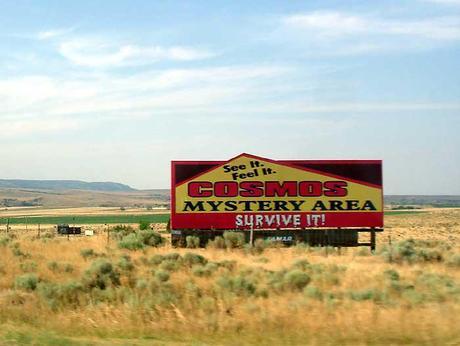It’s been a good week for chastising evangelical atheism. First, there was the free-will symposium which allowed us to wonder about the obsessions of the atheists and religionists tempestuating this non-issue in their teapot. Second, we have a Columbia University philosopher gently taking down The Atheists Guide to Reality: Enjoying Life without Illusions by Alex Rosenberg. Finally, we have another Columbia philosopher less gently taking down A Universe from Nothing: Why There is Something Rather than Nothing by Lawrence Krauss.
The take-downs have been occasioned by a peculiar kind of belief: the faith that science has explained everything, there are no mysteries, and there is nothing intractable left to ponder. While I greatly admire science and have few problems with what some derisively call scientism, I recognize there is much science hasn’t solved and may never solve.
This is not, of course, a warrant for the supernatural. As John Wilkins explained in this superb post, beliefs should be warranted. Science has provided us with a pretty good warrant to date and it’s only getting better. But as the Columbia philosophers recognize, a good warrant is different from an absolute or complete warrant.
Here is Philip Kitcher on Rosenberg’s book:
The evangelical scientism of “The Atheist’s Guide” rests on three principal ideas. The facts of microphysics determine everything under the sun (beyond it, too); Darwinian natural selection explains human behavior; and brilliant work in the still-young brain sciences shows us as we really are. Physics, in other words, is “the whole truth about reality”; we should achieve “a thoroughly Darwinian understanding of humans”; and neuroscience makes the abandonment of illusions “inescapable.” Morality, purpose and the quaint conceit of an enduring self all have to go.
The conclusions are premature. Although microphysics can help illuminate the chemical bond and the periodic table, very little physics and chemistry can actually be done with its fundamental concepts and methods, and using it to explain life, human behavior or human society is a greater challenge still. Many informed scholars doubt the possibility, even in principle, of understanding, say, economic transactions as complex interactions of subatomic particles. Rosenberg’s cheerful Darwinizing is no more convincing than his imperialist physics, and his tales about the evolutionary origins of everything from our penchant for narratives to our supposed dispositions to be nice to one another are throwbacks to the sociobiology of an earlier era, unfettered by methodological cautions that students of human evolution have learned: much of Rosenberg’s book is evolutionary psychology on stilts. Similarly, the neuroscientific discussions serenely extrapolate from what has been carefully demonstrated for the sea slug to conclusions about Homo sapiens.
And here is David Albert on Krauss’ book:
Lawrence M. Krauss, a well-known cosmologist and prolific popular-science writer, apparently means to announce to the world, in this new book, that the laws of quantum mechanics have in them the makings of a thoroughly scientific and adamantly secular explanation of why there is something rather than nothing. Period. Case closed. End of story. I kid you not. Look at the subtitle. Look at how Richard Dawkins sums it up in his afterword: “Even the last remaining trump card of the theologian, ‘Why is there something rather than nothing?,’ shrivels up before your eyes as you read these pages. If ‘On the Origin of Species’ was biology’s deadliest blow to supernaturalism, we may come to see ‘A Universe From Nothing’ as the equivalent from cosmology. The title means exactly what it says. And what it says is devastating.”
Well, let’s see. There are lots of different sorts of conversations one might want to have about a claim like that: conversations, say, about what it is to explain something, and about what it is to be a law of nature, and about what it is to be a physical thing. But since the space I have is limited, let me put those niceties aside and try to be quick, and crude, and concrete.
Following Albert’s quick, crude, and concrete demonstration that Krauss hasn’t explained the origins of everything, he concludes with this:
And I guess it ought to be mentioned, quite apart from the question of whether anything Krauss says turns out to be true or false, that the whole business of approaching the struggle with religion as if it were a card game, or a horse race, or some kind of battle of wits, just feels all wrong — or it does, at any rate, to me. When I was growing up, where I was growing up, there was a critique of religion according to which religion was cruel, and a lie, and a mechanism of enslavement, and something full of loathing and contempt for everything essentially human. Maybe that was true and maybe it wasn’t, but it had to do with important things — it had to do, that is, with history, and with suffering, and with the hope of a better world — and it seems like a pity, and more than a pity, and worse than a pity, with all that in the back of one’s head, to think that all that gets offered to us now, by guys like these, in books like this, is the pale, small, silly, nerdy accusation that religion is, I don’t know, dumb.
Because the philosophers here have struck the right chords and are on key, it brings to mind a juxtaposition: I can’t help but think that evangelical atheists, for all their scientific learning, are tone-deaf and atonal. This seems to be what happens when humility and wonder aren’t taken seriously. Our approaches to the cosmos and life should be positivist (sensu lato) and polyvalent.



